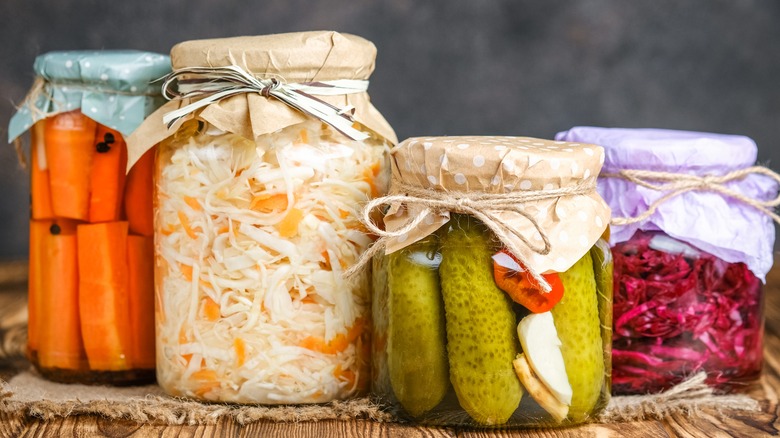The Truth About The AIP Diet
As described in a 2019 study published in Cureus, the autoimmune protocol (AIP) diet is a variation of the Paleo diet, designed to reduce intestinal and systemic inflammation and modify the body's immune response. The Paleo diet mimics the foods eaten by our hunter-gatherer ancestors living during the Paleolithic period, including meats, fish, fruits, vegetables, nuts and seeds (via the Mayo Clinic). Conversely, foods that were introduced into the human diet with the advent of agriculture around 10,000 years ago (e.g., grains, legumes, dairy) are restricted. The AIP diet, per the study, restricts additional foods (e.g., eggs, nuts and seeds) that can potentially trigger inflammation while focusing on eating nutrient-dense whole foods such as vegetables, fruits, tubers, unprocessed meats, and organ meats.
Autoimmune disorders are characterized by a faulty immune system that mistakenly attacks the body's own healthy cells and tissues, reports Today's Dietitian. Twice as common among females than among males, autoimmune diseases include celiac disease, inflammatory bowel disease (IBD), lupus, Sjogren's syndrome, psoriasis, type 1 diabetes, multiple sclerosis (MS), rheumatoid arthritis (RA), and Hashimoto's thyroiditis. While there is probably a genetic component to autoimmune disease, diet is a key factor as well. Processed foods high in calories and sugar can promote inflammation and autoimmunity, while sensitivities to specific foods (e.g., nightshade vegetables) can further trigger autoimmune disease. Research indicates that two autoimmune disorders in particular — IBD and Hashimoto's thyroiditis — improve with the AIP diet via reduced intestinal inflammation and better quality of life, respectively.
The elimination phase
Per Medical News Today, the first phase of the AIP diet involves the strict elimination of specific foods and additives and meticulous monitoring and recording of any reactions or symptoms. Tobacco and certain medications, particularly nonsteroidal anti-inflammatory drugs (NSAIDs), should also be avoided, reports Healthline. NSAIDs include ibuprofen, naproxen, diclofenac, and high dose aspirin. These restricted foods, additives, and medications are suspected of triggering an immune reaction, intestinal inflammation, or dysbiosis (an imbalance in the gut flora). Most people stick to the elimination phase for one to three months or until there is a distinct reduction in symptoms. In some individuals, symptom improvement may occur sooner, even in less than a month after beginning the diet.
Along with the elimination of suspicious foods and chemicals, recommendations from a 2017 study in the journal Inflammatory Bowel Diseases include the consumption of fresh, nutrient-dense foods, unprocessed meat, fermented foods, and bone broth. Stress management, sleep hygiene, exercise and other lifestyle enhancements are also advised.
Foods to avoid on the AIP diet
As reported by WebMD, many of the foods that should be avoided on the AIP diet are otherwise healthy foods such as grains, legumes, nuts, seeds, dairy, and eggs. On the other hand, the removal from the diet of processed foods, artificial sweeteners, and some vegetable oils is a wise strategy regardless of the AIP diet. Also prohibited are canned or dried fruits, chocolate, tapioca, and various herbs such as mustard seeds, coriander seeds, and fenugreek.
Per Medical News Today, vegetables in the nightshade family (including potatoes, tomatoes, peppers, and eggplant) are disallowed on the AIP diet as well. Interestingly, according to the Arthritis Foundation, some people claim that the chemical solanine contained in nightshades worsens their arthritis pain; however, scientific evidence is lacking.
In addition to the aforementioned foods, popular indulgences, including coffee and alcohol, as well food additives such as refined sugar must be bypassed when following the AIP diet (via Medical News Today).
Foods to eat on the AIP diet
According to Medical News Today, the core of the AIP diet should be whole foods that are free of additives and added sugar, including lean meats, liver, seafood abundant in omega-3 fatty acids, all vegetables (with the exception of nightshades), and small amounts of fruit.
Fermented foods such as coconut yogurt, kefir, kimchi, kombucha, and sauerkraut are recommended, per WebMD. Acceptable oils and fats include avocado oil, coconut oil, ghee, olive oil, and lard. Vinegar can still be used to balance oils for salads. In place of wheat flour, arrowroot and coconut flour can be used to make various breads and bread products. Herbs such as ginger, turmeric, basil, thyme, sage, oregano, rosemary, mint, and cinnamon can be used to spice things up.
Permissible beverages include herbal teas and coconut milk; bone broth is also encouraged (via Today's Dietitian). For dessert, sugar-free gelatin fits in well with the AIP diet (per WebMD).
The reintroduction phase
As described by Healthline, foods may begin to be reintroduced as soon as relief of symptoms has been achieved as a result of the elimination phase. The objective of the reintroduction phase is to pinpoint the specific foods or additives that provoke a recurrence of symptoms. The eliminated foods should be reintroduced slowly, one food at a time, so that any reaction is clearly noted. In order to detect possible delayed reactions, a sufficient time interval (5 to 7 days) between each food reintroduction is important. Foods that trigger symptom flare-ups should be avoided for the long term, while non-reactive foods can be brought back into the diet. Periodically, reintroduction of a reactive food may be repeated since tolerance to foods can improve (or worsen) at a later time.
A person's state of well-being and health status is another important factor that should be addressed when reintroducing foods. Unusually stressful circumstances caused by poor sleep, intense exercise, or infection can trigger inflammation and impact food tolerance, potentially skewing results. Also, special consideration should be given to the reintroduction of dairy. Dairy foods with very low lactose such as hard, aged cheeses or lactose-free milk are recommended for testing so as to distinguish between lactose intolerance and reactions to dairy protein per se.
U.S. News & World Report suggests beginning the reintroduction phase with foods that are traditionally less reactive, such as egg yolk, legumes, and berries. Foods that are historically more allergenic (e.g., egg whites, nuts and seeds) should be tested later.
The AIP diet and inflammation
According to a 2017 study in Frontiers in Immunology, a leaky gut plays a role in the development of autoimmune disease. A leaky gut is characterized by an increased permeability of the intestinal lining, allowing entry of environmental factors (in this case, food particles) into the body. When incompletely processed foods leak through the intestinal barrier and enter the body, they may be mistaken as foreign substances by the immune system, eliciting an inflammatory immune response.
In people that are genetically predisposed, a leaky gut and associated inflammation may contribute to the development or worsening of autoimmune disease. A healthy gut microbiota is important in maintaining the integrity of the intestinal barrier and preventing leaky gut and inflammation. Elimination diets such as the AIP diet act in part by reducing overgrowth of proinflammatory bacteria in the gut, thereby promoting a balanced intestinal microbiota (per a 2019 study in the journal Crohn's and Colitis 360).
In a study published in a 2017 edition of Inflammatory Bowel Diseases, the AIP diet was shown to reduce intestinal inflammation as well as improve the appearance of the intestinal lining in patients with Crohn's disease and ulcerative colitis. Per research, the AIP diet not only improves inflammation localized to the gut, but systemic inflammation as well. Blood levels of C-reactive protein or CRP (a major marker of systemic inflammation) were significantly reduced by 29% in patients with autoimmune thyroiditis, as reported in a 2019 study in the journal Cureus.
The AIP diet and inflammatory bowel disease
One of the most researched applications of the AIP diet is in the treatment of inflammatory bowel disease (IBD), which includes Crohn's disease and ulcerative colitis. In a study published in a 2017 edition of Inflammatory Bowel Diseases, 15 IBD patients who had the disease for an average of 19 years underwent the elimination phase of the AIP diet for six weeks and continued food avoidance for five more weeks. The AIP diet was used as a complementary therapy to medical treatment; nearly half of the participants were on biological therapy. Remarkably, by week 6, 73% of the patients achieved clinical remission and maintained clinical remission throughout the subsequent five weeks. These impressive findings are on par with most drug therapies for IBD.
In a follow-up analysis published in a 2019 edition of Crohn's and Colitis 360, changes in gene expression induced by the AIP diet were identified in a small subset of patients with ulcerative colitis. These were observed in a total of 324 genes, some of which were associated with reduced inflammation of the intestinal lining (mucosa) and decreased oxidative stress (free radical damage to DNA, proteins, and fats). Other modified genes were linked to healing of the mucosa that involved the synthesis of proteins and fatty acids, as well as DNA repair.
In addition to clinical remission, substantially improved quality of life has also been achieved in IBD patients from dietary modification via the AIP diet (per a 2019 study in Crohn's and Colitis 360).
How the AIP diet affects Hashimoto's thyroiditis
According to a 2020 study in the Annals of Agricultural and Environmental Medicine, Hashimoto's thyroiditis — an autoimmune disease in which the immune system attacks the thyroid gland causing low thyroid function — requires the elimination of potentially harmful food antigens (substances that trigger an immune response). Gluten (the protein in wheat, rye, and barley) is especially important, because there is a strong link between autoimmune thyroiditis and celiac disease (an autoimmune disease triggered by gluten). This association is related to cross-reactivity of the immune system caused by structural similarities between gliadin (a component of gluten) and specific thyroid proteins.
In other words, in people with both conditions, antibodies against gluten can attack and damage the thyroid gland as well. The prevalence of celiac disease among people with Hashimoto's thyroid disease is up to ten times greater than the general population. Indeed, people with autoimmune thyroid disease should be screened for celiac disease.
While gluten is off-limits on the AIP diet, is there any evidence that the AIP diet as a whole improves Hashimoto's thyroiditis? A study in a 2019 edition of Cureus reported significant improvement in health-related quality of life in women with Hashimoto's thyroiditis after following the AIP diet for 10 weeks. There were no significant changes in measures of thyroid function; nevertheless, the AIP diet caused a robust improvement in clinical symptoms, as well as significantly decreased systemic inflammation in the study participants with autoimmune thyroid disease.
The AIP diet and diabetes
The AIP diet is very similar to the Paleo diet. In fact, per WebMD, the AIP diet is alternatively referred to as the autoimmune paleo diet. In a 2015 controlled study in the European Journal of Clinical Nutrition, people with type 2 diabetes were randomized to consume either a Paleo diet or a standard diet based on recommendations by the American Diabetes Association (ADA) for 21 days. The Paleo diet consisted of meat, fish, poultry, eggs, fruits, vegetables, nuts, potatoes, canola oil, mayonnaise, and honey; added salt, cereal grains, legumes, and dairy were excluded. The ADA diet included low-fat dairy, whole grains, legumes, and salt in moderation. Compared with people on the ADA diet, individuals on the Paleo diet experienced greater benefits on glucose control (e.g., lower fasting blood glucose) and on lipid profiles (e.g., serum cholesterol and triglycerides). Moreover, significant improvements in insulin sensitivity in the most insulin-resistant participants were only associated with consumption of the Paleo diet.
The Paleo diet has also been shown to improve risk factors associated with the development of type 2 diabetes. In a study in a 2009 edition of the European Journal of Clinical Nutrition, short-term consumption of a Paleo diet significantly improved glucose tolerance and insulin sensitivity in healthy, nondiabetic volunteers. These benefits were achieved without weight loss.
Since the AIP diet is more restrictive than the Paleo diet, it is reasonable to assume that the AIP diet would have similar benefits in both the prevention and management of type 2 diabetes.
Are there health risks associated with the AIP diet?
Due to the many food limitations on the AIP diet, a person may be at risk of social isolation, reports Healthline. Social situations such as dining at restaurants or eating at dinner parties present a difficult challenge for people following the elimination phase of the diet. This is especially true for those who remain on the elimination phase for an extended period. For instance, some people may feel so much better on the restricted phase that they skip the reintroduction phase.
However, apart from social isolation, long-term adherence to such a limited diet can lead to nutritional deficiencies, and may undermine overall health. According to U.S. News & World Report, the avoidance of entire food groups can result in deficits of essential vitamins such vitamins B and D, as well as critical minerals such as calcium. Also, dietary intake of heart-healthy fiber may be lacking without consumption of whole grains. Ultimately, it is vitally important to bring nonreactive foods back into the diet via the reintroduction phase.
Pros of the AIP diet
As it is designed to do, the AIP diet can help improve symptoms and manage flare-ups in people with autoimmune disease, per WebMD. An added bonus of the AIP diet is weight loss, if desired. The elimination of refined sugar and highly processed, calorie-rich foods is certainly conducive to losing unwanted body fat.
As noted by U.S. News & World Report, the AIP diet does not restrict high-quality protein foods such as meat and seafood, nor does it limit fiber-rich fruits and vegetables (except nightshades). Quality protein and dietary fiber are important for satiety by providing that full feeling after meals. Greater satiety after meals leads to less snacking on carbs, and more weight loss. Also, taste is not compromised on the AIP diet, since salt is permitted. Himalayan pink salt, Celtic Sea salt, and other unrefined salts are preferred over table salt.
Lastly, various resources providing helpful tips and information about the AIP diet are readily available. Food guides for removing and reintroducing foods, meal plans and recipes that are AIP-friendly, and even lifestyle and exercise suggestions can be found on various websites that cater to Paleo enthusiasts or people with autoimmune disease. AIP cookbooks, either in print or electronic, are also accessible.
Other effects of the AIP diet
Overall, the AIP diet is quite demanding, reports U.S. News & World Report. Avoiding commonplace foods such as bread and countless bread products (e.g., crackers, pancakes, bagels, biscuits, etc.) as well as milk, cheese, yogurt and other dairy foods can be challenging. Adjusting to new replacement foods can also be difficult. Planning menus, shopping, and preparing meals can take an inordinate amount of time. Reintroducing foods can also be burdensome. Correlating any sign or symptom with each food tested requires very careful attention to detail. Eating out at restaurants may be stressful as well; it's important to be very observant when ordering, particularly with foods that may contain gluten or dairy.
If the elimination phase is carried on for too long, notes WebMD, adequate intake of some essential nutrients may be compromised. Whole grains and dairy are major sources of fiber and calcium, respectively. Among several benefits, dietary fiber is associated with healthy bowel function and moderation of blood levels of glucose and cholesterol. Dairy is the best source of bioavailable calcium needed to support bone health. Alternative food sources of these potentially deficient nutrients should be included in the AIP diet, provided they are permissible.












